Unit 8 Natural disasters 表格式教学案(5课时)
文档属性
| 名称 | Unit 8 Natural disasters 表格式教学案(5课时) | 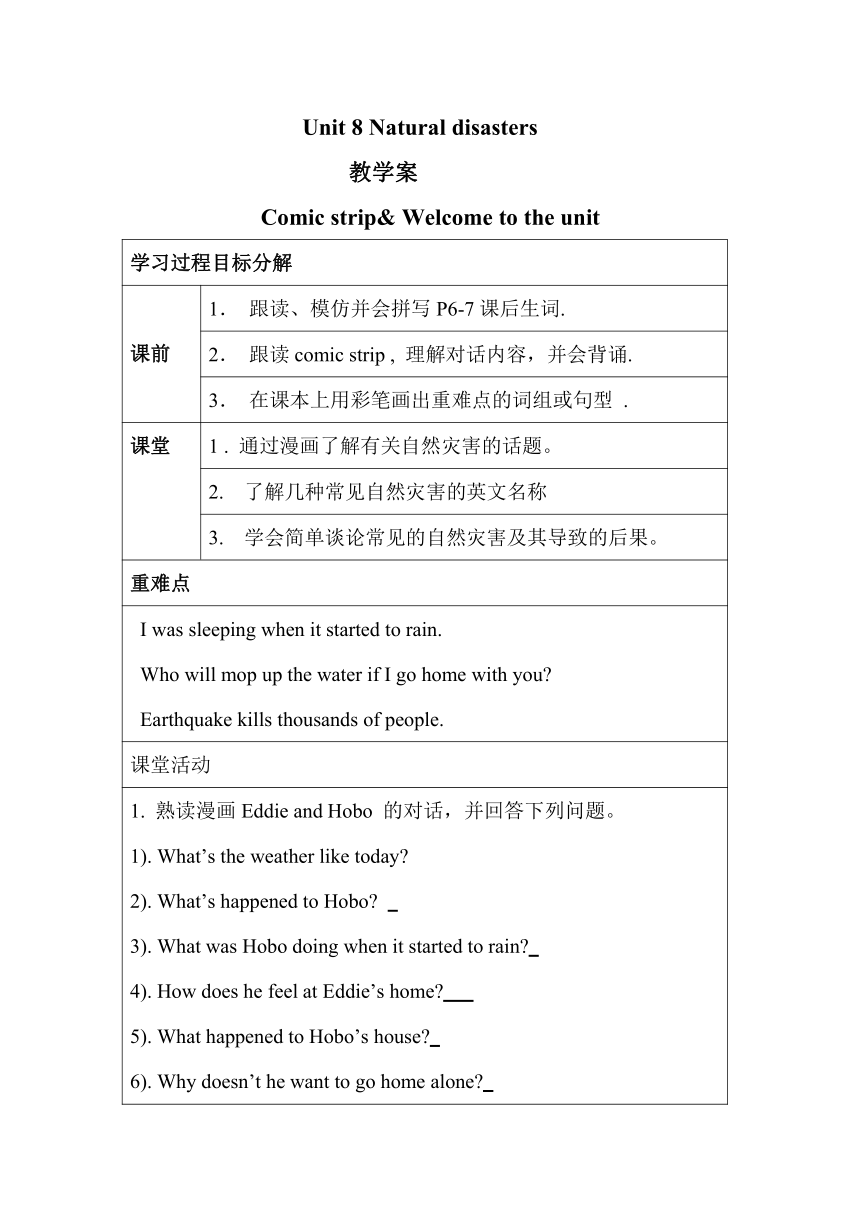 | |
| 格式 | zip | ||
| 文件大小 | 185.3KB | ||
| 资源类型 | 教案 | ||
| 版本资源 | 牛津译林版 | ||
| 科目 | 英语 | ||
| 更新时间 | 2017-05-17 19:30:07 | ||
图片预览

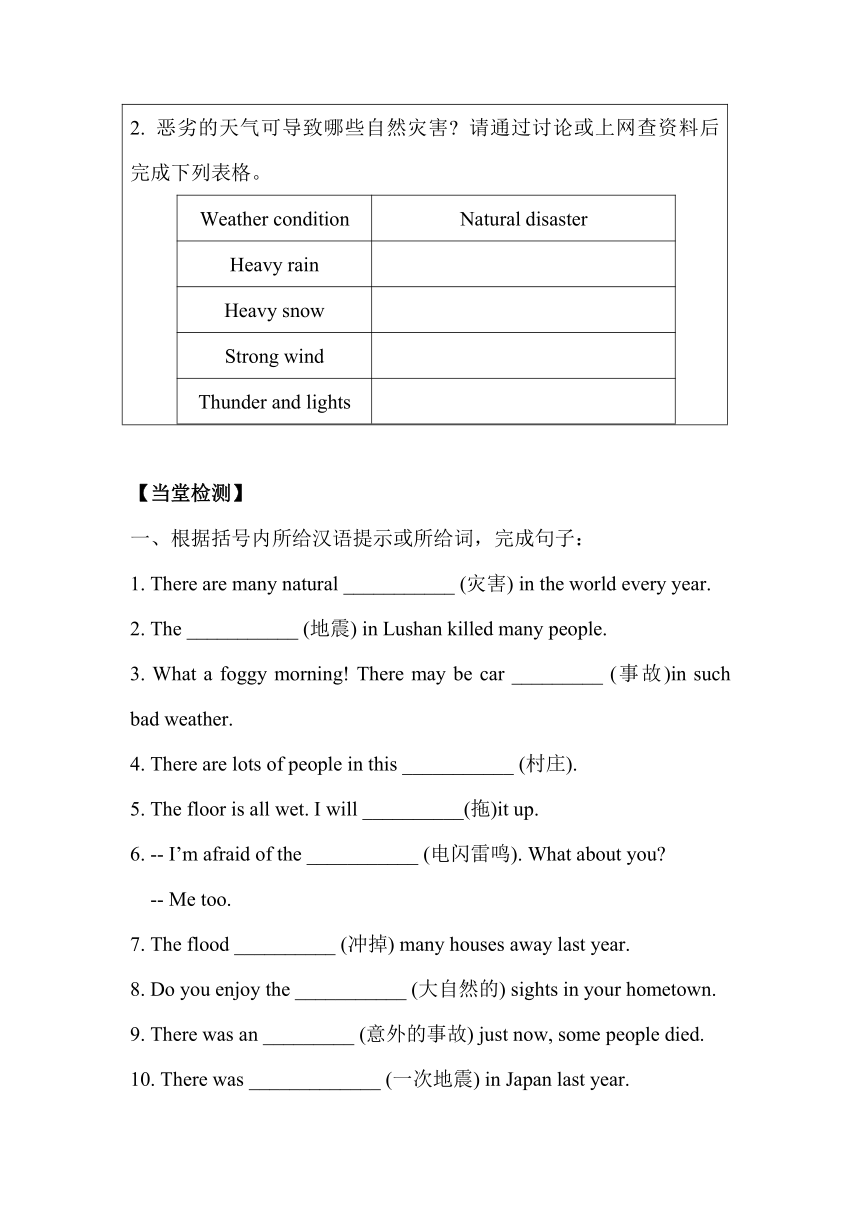
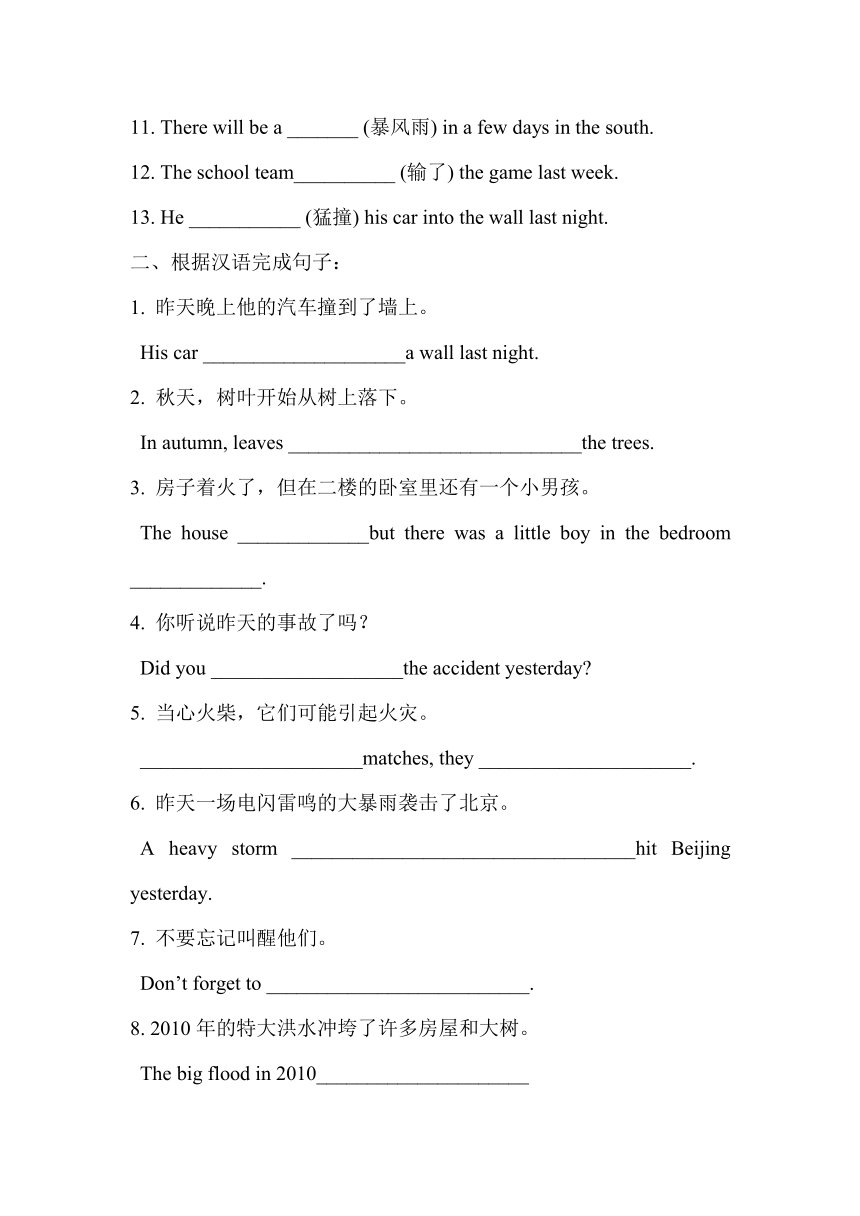
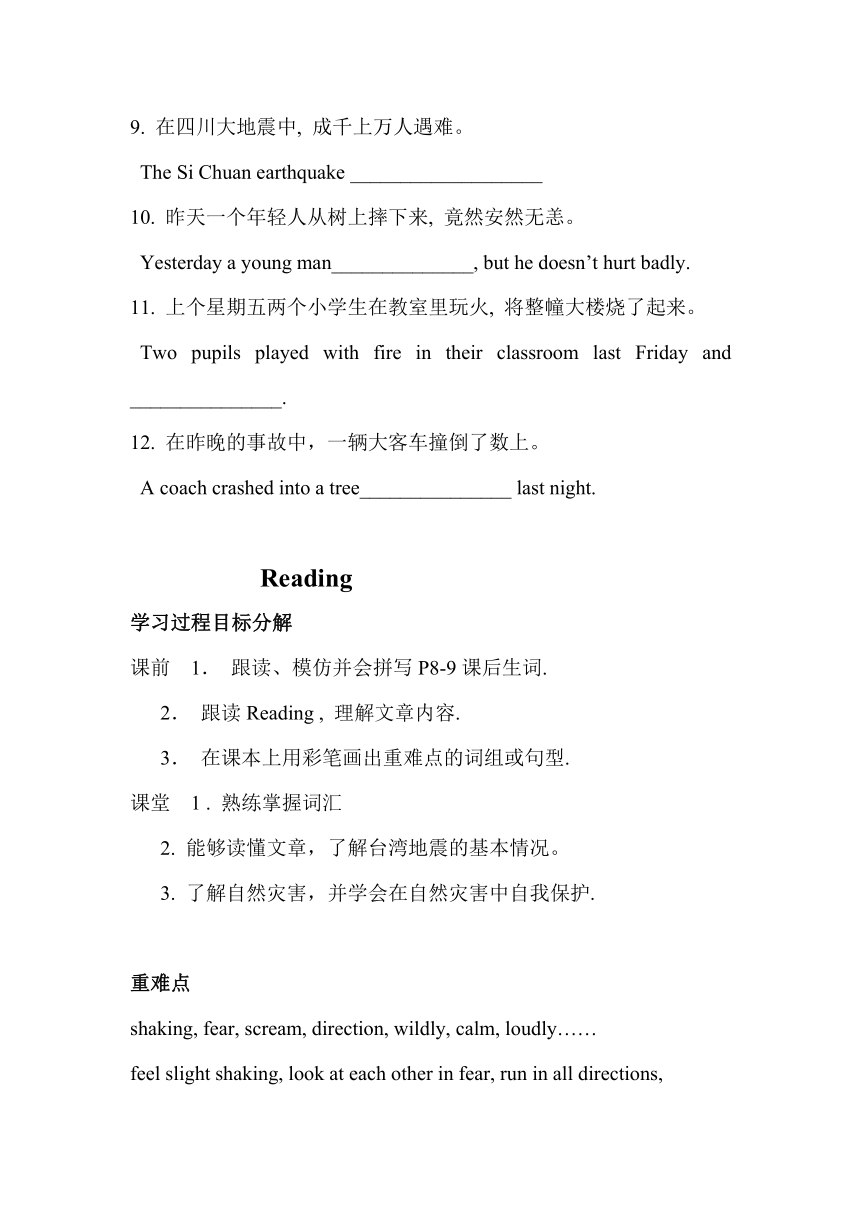
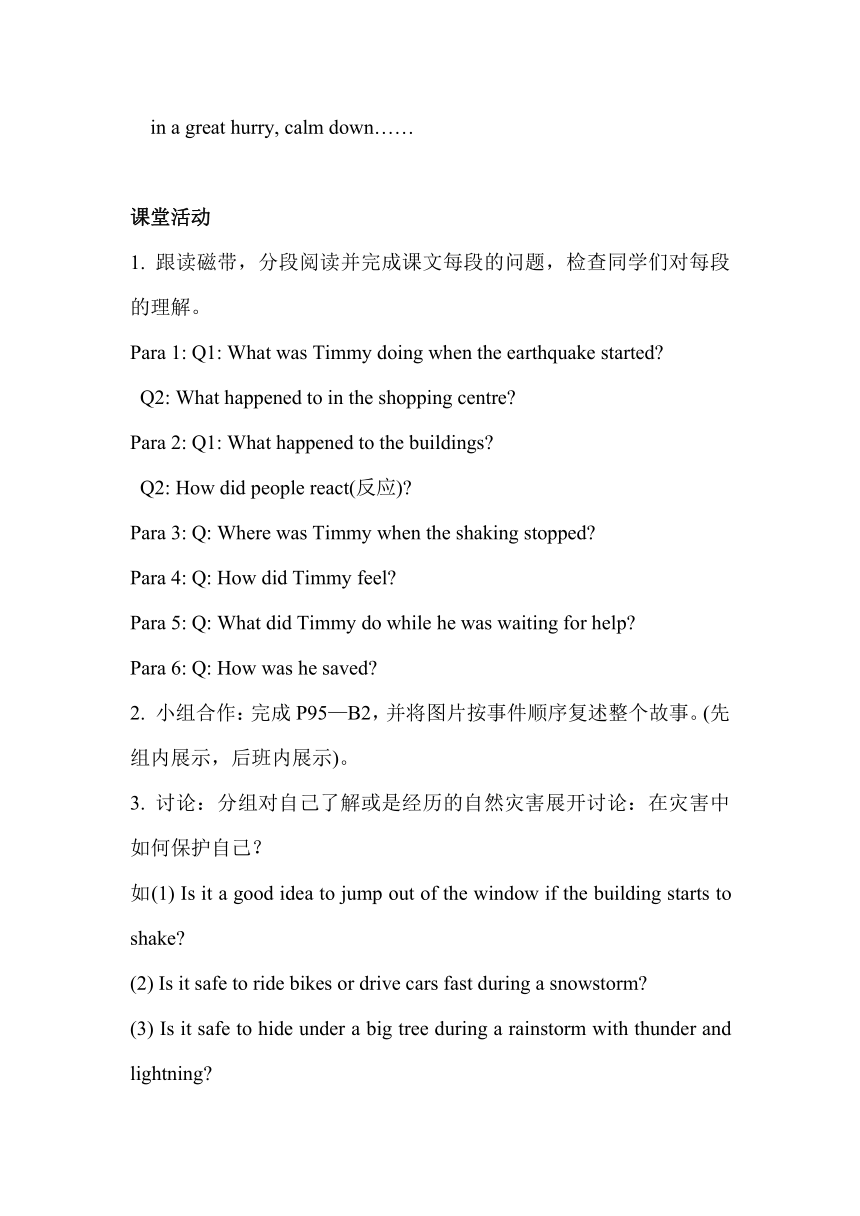
文档简介
Unit
8
Natural
disasters
教学案
Comic
strip&
Welcome
to
the
unit
学习过程目标分解
课前
1.
跟读、模仿并会拼写P6-7课后生词.
2.
跟读comic
strip
,
理解对话内容,并会背诵.
3.
在课本上用彩笔画出重难点的词组或句型
.
课堂
1
.
通过漫画了解有关自然灾害的话题。
2.
了解几种常见自然灾害的英文名称
3.
学会简单谈论常见的自然灾害及其导致的后果。
重难点
I
was
sleeping
when
it
started
to
rain.
Who
will
mop
up
the
water
if
I
go
home
with
you
Earthquake
kills
thousands
of
people.
课堂活动
1.
熟读漫画Eddie
and
Hobo
的对话,并回答下列问题。1).
What’s
the
weather
like
today
2).
What’s
happened
to
Hobo
3).
What
was
Hobo
doing
when
it
started
to
rain
4).
How
does
he
feel
at
Eddie’s
home
5).
What
happened
to
Hobo’s
house
6).
Why
doesn’t
he
want
to
go
home
alone
2.
恶劣的天气可导致哪些自然灾害
请通过讨论或上网查资料后完成下列表格。Weather
conditionNatural
disasterHeavy
rainHeavy
snowStrong
windThunder
and
lights
【当堂检测】
一、根据括号内所给汉语提示或所给词,完成句子:
1.
There
are
many
natural
___________
(灾害)
in
the
world
every
year.
2.
The
___________
(地震)
in
Lushan
killed
many
people.
3.
What
a
foggy
morning!
There
may
be
car
_________
(事故)in
such
bad
weather.
4.
There
are
lots
of
people
in
this
___________
(村庄).
5.
The
floor
is
all
wet.
I
will
__________(拖)it
up.
6.
--
I’m
afraid
of
the
___________
(电闪雷鸣).
What
about
you
--
Me
too.
7.
The
flood
__________
(冲掉)
many
houses
away
last
year.
8.
Do
you
enjoy
the
___________
(大自然的)
sights
in
your
hometown.
9.
There
was
an
_________
(意外的事故)
just
now,
some
people
died.
10.
There
was
_____________
(一次地震)
in
Japan
last
year.
11.
There
will
be
a
_______
(暴风雨)
in
a
few
days
in
the
south.
12.
The
school
team__________
(输了)
the
game
last
week.
13.
He
___________
(猛撞)
his
car
into
the
wall
last
night.
二、根据汉语完成句子:
1.
昨天晚上他的汽车撞到了墙上。
His
car
____________________a
wall
last
night.
2.
秋天,树叶开始从树上落下。
In
autumn,
leaves
_____________________________the
trees.
3.
房子着火了,但在二楼的卧室里还有一个小男孩。
The
house
_____________but
there
was
a
little
boy
in
the
bedroom
_____________.
4.
你听说昨天的事故了吗?
Did
you
___________________the
accident
yesterday
5.
当心火柴,它们可能引起火灾。
______________________matches,
they
_____________________.
6.
昨天一场电闪雷鸣的大暴雨袭击了北京。
A
heavy
storm
__________________________________hit
Beijing
yesterday.
7.
不要忘记叫醒他们。
Don’t
forget
to
__________________________.
8.
2010年的特大洪水冲垮了许多房屋和大树。
The
big
flood
in
2010_____________________
9.
在四川大地震中,
成千上万人遇难。
The
Si
Chuan
earthquake
___________________
10.
昨天一个年轻人从树上摔下来,
竟然安然无恙。
Yesterday
a
young
man______________,
but
he
doesn’t
hurt
badly.
11.
上个星期五两个小学生在教室里玩火,
将整幢大楼烧了起来。
Two
pupils
played
with
fire
in
their
classroom
last
Friday
and
_______________.
12.
在昨晚的事故中,一辆大客车撞倒了数上。
A
coach
crashed
into
a
tree_______________
last
night.
Reading
学习过程目标分解
课前
1.
跟读、模仿并会拼写P8-9课后生词.
2.
跟读Reading
,
理解文章内容.
3.
在课本上用彩笔画出重难点的词组或句型.
课堂
1
.
熟练掌握词汇
2.
能够读懂文章,了解台湾地震的基本情况。
3.
了解自然灾害,并学会在自然灾害中自我保护.
重难点
shaking,
fear,
scream,
direction,
wildly,
calm,
loudly……
feel
slight
shaking,
look
at
each
other
in
fear,
run
in
all
directions,
in
a
great
hurry,
calm
down……
课堂活动
1.
跟读磁带,分段阅读并完成课文每段的问题,检查同学们对每段的理解。
Para
1:
Q1:
What
was
Timmy
doing
when
the
earthquake
started
Q2:
What
happened
to
in
the
shopping
centre
Para
2:
Q1:
What
happened
to
the
buildings
Q2:
How
did
people
react(反应)
Para
3:
Q:
Where
was
Timmy
when
the
shaking
stopped
Para
4:
Q:
How
did
Timmy
feel
Para
5:
Q:
What
did
Timmy
do
while
he
was
waiting
for
help
Para
6:
Q:
How
was
he
saved
2.
小组合作:完成P95—B2,并将图片按事件顺序复述整个故事。(先组内展示,后班内展示)。
3.
讨论:分组对自己了解或是经历的自然灾害展开讨论:在灾害中如何保护自己?
如(1)
Is
it
a
good
idea
to
jump
out
of
the
window
if
the
building
starts
to
shake
(2)
Is
it
safe
to
ride
bikes
or
drive
cars
fast
during
a
snowstorm
(3)
Is
it
safe
to
hide
under
a
big
tree
during
a
rainstorm
with
thunder
and
lightning
(4)
What
can
we
do
if
we
don’t
have
time
to
escape
【当堂检测】
一、根据中文提示或句意写出单词:
1.
I
went
to
the
____
____
centre
and
bought
many
things.
2.
She
______
______
(感觉)
sick
and
went
to
see
a
doctor.
3.
It
sounds
____
____
bombs
in
the
sky.
4.
Don’t
run
in
all
_________
___
(方向).
5.
I
tried
my
________
__
to
work
hard
at
English.
6.
I
was
caught
in
the
rain
and
I
was
all
w____
____
on
my
way
to
school.
7.
I
am
feeling
a
slight
s____
___
(发抖)
through
my
body.
8.
They
looked
at
each
other
in
f_______
__
and
felt
frightened.
9.
Some
girls
s_____
__
because
they
were
frightened.
10.
Then
I
c_____
__
down
and
asked
myself
where
I
am.
11.
______________
(既然)
everyone
is
here,
let’s
begin
our
class.
二、用括号中所给单词的适当形式填空:
1.
I
shouted
_________
__
(loud)
for
help.
2.
Tom
fell
off
the
tree
and
looked
at
his
__________
(break)
leg
on
fear.
3.
Then,
the
_________
(really)
noise
came,
like
bombs
under
the
ground.
4.“I
can’t
stay
here.”
the
boy
said
to
____________
(he).
5.
An
earthquake
_______
____
(survive)
told
us
the
story.
6.
There
are
many
______________
(nature)
disasters
in
the
world.
7.
The
earthquake
killed
______________
(thousand)
of
people.
8.
I
_____________
(do)
my
homework
when
my
father
came
home.
9.
The
earthquake
in
Ya’an
_______________
(kill)
hundreds
of
people.
10.
I
couldn’t
finish
the
work
_______________
(with)
your
help.
11.
People
were
very
frightened.
They
ran
in
all
___________
(direction).
12.
I
told
myself
to
calm
down
since
I
was
still
______________
(live).
Grammar
学习过程目标分解
课前
1.
跟读、模仿并会拼写P11-12课后生词。
课堂
掌握下列词汇及句型
能够了解并掌握过去进行时态
3.
学习when/while
在过去进行时中的用法。
重难点
1.
过去进行时的用法:①
过去某个时间正在发生的动作。e.g.
He
was
cooking
at
six
last
night.
昨天晚上六点,他正在做饭。②
过去某段时间正在发生的动作。
e.g.
I
was
staying
here
from
March
to
May
last
year.
去年从三月到五月,我一直呆在这里。2.
常与过去进行时连用的时间状语,有:at
nine
last
night,
at
that
time
=then/at
this
time
yesterday,
when
the
teacher
came
in,
while
he
was
reading等。3.
过去进行时的构成:was/were
+
v-ing4.
过去进行时的四个基本句型。①
肯定句:
He
was
cooking
at
six
last
night. ②
否定句:
He
was
not
cooking
at
six
last
night. ③
一般疑问句:
Was
he
cooking
at
six
last
night
回答:
Yes,
he
was.
No,
he
wasn’t.
④
特殊疑问句: What
was
he
doing
at
six
last
night 5.
过去进行时的固定句型。1)
根据汉语意思翻译下列句子。①
当发生地震时,我正在购物。I
______
_______
some
shopping
when
it
__________.②
当玻璃、瓦片往下掉的时候,人们正慌乱地跑着。People
______
_________
wildly
while
pieces
of
glass
and
bricks
________
________
down.③
我正在寻找出路时,突然我听到头顶上有声音。I
________
________
to
find
my
way
out
when
I
suddenly
________Some
noise
above
me.
2)
讨论:有时为了句子表达的需要,我们可以用复合句来表达过去进行时,如以上3句。3)
在过去进行时中when 和while用法及其区别。①
昨晚当我到家的时候,妈妈和爸爸正在看电视。My
parents_________
(watch)
TV
when
I
arrived
home
last
night.②
刚才当老师走进教室的时候,学生们正在读书。Students
_________
(read)when
the
teacher
came
in
just
now.总结:1.
在这些句子中,when引导的句子表示过去的某一个具体的时间,when从句用一般过去时,而它的主句用过去进行时。2.
但是若强调某个动作正在进行中时,又发生了别的动作,用when从句。when从句必用过去进行时,主句用一般过去时。若表示在when从句正进行期间又发生了主句的动作,此时,when=while,表时间段。e.g.
_______
___we
were
having
supper,
the
light
went
out.____________he
was
riding
a
bike,
he
fell
off
and
hurt
his
leg.3.
若主、从句两个延续动作同时进行,用while,则主句与从句都用进行时,此时,while译为“而”
“一边,一边”。e.g.
He
was
reading
the
newspaper
__________
I
was
studying.4.
以小组形式提出疑问,小组讨论,组间交流答疑。
课堂活动
1.
根据图形用过去进行造句并总结规律。1).
He
is
swimming
now.
(用at
this
time
yesterday)He
_____
swimming
at
this
time
yesterday2).
It
is
raining
now.
(用the
whole
night
yesterday改写)It
________
the
whole
night
yesterday3).
They
are
dancing
now.
(用at
4
p.m.
yesterday改写)They
_____
_______at
4
p.m.
yesterday2.
小组模仿回答。Q:What
was
Mr.
Wu/Simon/Millie/Sandy
doing
when
the
snowstorm
came ①
Mr.
Wu
_________________
when
the
snowstorm
came.
=
______________________________________.②
Simon
_________________
when
the
snowstorm
came.
=___________________________________________.③
Millie
________________
when
the
snowstorm
came.
=________________________________________________.④
Sandy
_________________
when
the
snowstorm
came.
=______________________________________________.总结规律:句子1
(延续性动作)(过去进行时)+
When
+句子2
(短暂性动作)
=
When
+句子2
(短暂性动作),句子1(延续性动作)
(注:
When也可延续性动作)3.
用while改写例句。e.g.
I
came
while
the
girl
was
dancing.=
While
the
girl
was
dancing,
I
came.用while改写以上第一题中的4个答句。
①_______________________________________.=
.②__________________________________.=
.③_______________________________________.=
④__________________________________.=
___________________________
【当堂检测】
一、单项选择:
(
)1.
My
brother
his
book
in
the
classroom
when
I
came
in.
A.
read
B.
reads
C.
was
reading
D.
is
reading
(
)2.
--I
phoned
you
last
night
but
no
one
answered.
--Sorry,
I
to
music.
A.
1isten
B.
1istened
C.
was
listening
D.
have
listened
(
)3.
When
I
went
to
say
goodbye
to
Anna,
she
the
piano
A.
is
playing
B.
plays
C.
was
playing
D.
played.
(
)4.
--What
do
you
think
of
the
colour
of
my
new
dress
--Sorry,
but
what
did
you
say
I
about
something
else.
(2007年扬州市)|
A.
think
B.
thought
C.
am
thinking
D.
was
thinking
(
)5.
Timmy
was
doing
some
shopping
when
the
earthquake
.
A.
started
B.
would
started
C.
would
start
D.
was
starting
(
)6.
My
keys
are
not
in
my
pocket
I
must
forget
the
.
A.
take
B.
taking
C.
took
D.
to
take
二、用所给动词的适当形式填空:
1.
Now
Jim’s
sister
__________________
(read)
newspapers.
2.
He
__________________
(watch)TV
at
nine
last
night.
3.
He
_____
____
(watch)TV
last
night.
4.
What
________
the
twins
___
_
(do)
then
5.------________Lily
______
___
(draw)
a
cat
when
the
teacher
came
in
------No,
she
_________.
6. _______
you
_________
(have)
supper
at
that
time
7.
Jack
________________
(not
read)
a
book
at
nine
yesterday
evening.
8.
Now
Jim
________________
(play)
basketball
on
the
playground.
9.
What
_______________
he
______________
(do)
at
nine
o’clock
last
night
10.They
___________________
(listen)
to
the
music
at
that
time.
11.
When
the
teacher
came
in,
the
students
___________________
(read)
the
text.
12.
We
_________________
(watch)
TV
when
suddenly
the
telephone
rang.
13.
Her
mother
___________
(cook)
while
her
father
was
watching
TV.
三、用when
和
while填空:
1.
Mother
was
cooking
______father
was
watching
DVD
last
night.
2.
________
Tommy
got
there,
the
famous
scientists
was
giving
a
talk
on
traveling.
3.
_______
the
famous
scientist
was
giving
a
talk
on
traveling,
Tommy
got
there.
4.
The
singer
waved
to
us
______
she
was
singing
the
song.
5.
____
__
they
were
playing
basketball,
we
were
cheering
for
them.
6.
The
telephone
rang
_______
David
was
sleeping
last
night.
7.
_______
the
telephone
rang,
David
was
sleeping
last
night.
8.
_______
my
uncle
came
to
see
me,
I
was
reading.
Integrated
skills
学习过程目标分解
课前
1.
跟读、模仿并会拼写P13-14课后生词.
2.
跟读speak
up,
理解对话内容,并会背诵.
3.
在课本上用彩笔画出重难点的词组或句型
.
课堂
1
.
能听懂录音内容,并能从听力材料中提取重要信息完成练习。
2.
了解紧急求助电话中需要用到的关键表达法。
3.
能用英语谈论如何急救,培养学生自我保护的意识.
重难点
rule
railway,
burn,
towel,
as
…
as
possible,
cover
…
with,
protect
oneself
from,
stay
low
to
the
ground,
follow
traffic
rules.
课堂活动
1.
小组讨论:简要描述P99图片,并讨论使用哪个号码?2.两人一组,回答下列问题:1)
What
should
we
do
when
there
is
a
flood
What
mustn’t
we
do 2)
What
may
happen
when
we
cook
What
should
we
do
when
we
burn
ourselves 3.
小组合作,编写新的对话,并试着表演对话。
【当堂检测】
一、根据句意或汉字提示完成所缺单词:
1.
It
is
very
important
for
us
(保护)
the
environment.
2.There
is
a
(铁路)
station
near
his
home.
3.This
is
a
new
(规则)
of
our
school.
4.Amy
has
got
a
(牙疼),
she
didn’t
want
to
eat
anything.
5.
Mr.
Green
(烧伤)
his
arms,
but
it
was
not
serious.
二、用所给词的适当形式填空:
1.
Lucy
_____
__
(walk)
down
the
street
when
she
hit
a
tree.
2.
Don’t
worry,
here
__
__
(come
)
the
bus.
3.
Tell
the
children______
___
(not
play)
in
the
street.
4.
Can’t
you
hear
someone
____
___
(scream)
for
help
now
5.
Would
you
please
___
___
(not
talk)
loudly
here
6.
What
would
you
like
______
(be)
when
you
grow
up
7.
My
mother
__
___
(mop)
the
floor
while
my
father
and
I
__
_
(play)
games
at
that
time.
8.Do
you
often
see
the
man
________
(wait)
for
the
bus
here
Questions:
_______________________________
Task
学习过程目标分解
课前
1.
跟读、模仿并会拼写P40-41课后生词.
2.
跟读Task
,
理解文章内容.
3.
在课本上用彩笔画出重难点的词组或句型
.
课堂
1.
学习在写作中陈述事实性信息。
2.
学会通过列要点来构思文章.
3.
尝试写一篇有关自然灾害的文章
重难点
词汇:nearly,
clear,
behind;词组:share…with…
keep
falling
nearly
fall
over
clear
the
snow
come
from
behind句型:I
was
doing
my
homework
in
the
classroom
when
Mr.
Wu
came
in
and
told
us
to
go
home
early.
My
parents
could
not
get
home
that
night
because
of
the
heavy
snow…
When
we
arrived
at
the
bus
stop,
we
saw
many
people
waiting
there.
课堂活动
1.
对Sandy所经历的暴风雪的信息进行提问。
如:When
did
the
snowstorm
hit
Beijing Whom
did
Sandy
share
an
umbrella
with Where
did
Sandy
live
in
for
the
whole
night How
did
Sandy
feel
the
snowstorm
2.
快速阅读B部分,并用A部分的信息完成B部分的填空。3.
文章写作结构分析。Para.
____
___
Introduce
Para.
_____
__
During
the
snowstormPara.
______
_
After
the
snowstorm
【当堂检测】
一、单项选择:
(
)
1.
—
Were
you
when
you
were
speaking
in
front
of
so
many
people
—
Not
at
all.
I
spent
plenty
of
time
preparing
for
it,
you
know.
A.
calm
B.
nervous
C.
patient
D.
surprised
(
)
2.
—
How
did
you
make
your
way
out
the
dark
—
Well,
I
walked
along
the
wall.
A.
across
B.
past
C.
along
D.
through
(
)
3.
—
Is
that
a
baby
crying
outside
—
No.
It
a
baby.
But
in
fact,
it
is
my
neighbour’s
cat.
A.
looks
like
B.
sounds
like
C.
feels
like
D.
hears
like
(
)
4.
—
Our
team
scored
a
goal
just
now.
—
Yes.
I
heard
the
children’s
shouts.
A.
exciting
B.
excited
C.
excitedly
D.
excitingly
(
)
5.
—
you’re
here,
why
not
find
a
hotel
for
the
night
—
Maybe
we
have
to.
I
am
too
tired
to
walk
any
farther.
A.
But
B.
And
C.
Since
D.
So
(
)
6.
—
Does
your
father
watch
you
do
your
homework
—
No.
But
he
usually
does
some
reading
in
the
sitting
room
I
am
doing
my
homework.
A.
after
B.
before
C.
while
D.
until
(
)
7.
—
I
think
myself
a
brave
girl.
—
Really
But
why
did
you
when
you
saw
my
neighbour’s
dog
A.
smile
B.
laugh
C.
scream
D.
frighten
(
)
8.
—
What’s
wrong
with
Mark
today
—
He
has
got
a
cold
and
feels
a
little
uncomfortable.
A.
small
B.
big
C.
slight
D.
light
(
)
9.
—
Why
do
you
like
rock
climbing
—
Well,
to
myself
up
is
not
easy,
but
I
feel
great
when
I
am
on
the
top.
A.
push
B.
carry
C.
leave
D.
pull
(
)
10.
—
Do
you
know
if
the
snow
this
afternoon
—
I
don’t
know.
But
I
hope
so.
We
will
make
a
snowman
if
it
enough.
A.
will
stop;
snows
B.
will
stop;
will
snow
C.
stops;
snows
D.
stops;
will
snow
二、以“A
disaster
in
my
home
town”为题写一篇70词左右的短文。
1.
灾难发生的时间;
2.
灾难过程中人们的遭遇及感受;
3.
发表自己的感想以及怎样阻止自然灾害的发生。
A
disaster
in
my
home
town
___________________________________________________________
___________________________________________________________
___________________________________________________________
___________________________________________________________
___________________________________________________________
___________________________________________________________
___________________________________________________________
___________________________________________________________
___________________________________________________________
8
Natural
disasters
教学案
Comic
strip&
Welcome
to
the
unit
学习过程目标分解
课前
1.
跟读、模仿并会拼写P6-7课后生词.
2.
跟读comic
strip
,
理解对话内容,并会背诵.
3.
在课本上用彩笔画出重难点的词组或句型
.
课堂
1
.
通过漫画了解有关自然灾害的话题。
2.
了解几种常见自然灾害的英文名称
3.
学会简单谈论常见的自然灾害及其导致的后果。
重难点
I
was
sleeping
when
it
started
to
rain.
Who
will
mop
up
the
water
if
I
go
home
with
you
Earthquake
kills
thousands
of
people.
课堂活动
1.
熟读漫画Eddie
and
Hobo
的对话,并回答下列问题。1).
What’s
the
weather
like
today
2).
What’s
happened
to
Hobo
3).
What
was
Hobo
doing
when
it
started
to
rain
4).
How
does
he
feel
at
Eddie’s
home
5).
What
happened
to
Hobo’s
house
6).
Why
doesn’t
he
want
to
go
home
alone
2.
恶劣的天气可导致哪些自然灾害
请通过讨论或上网查资料后完成下列表格。Weather
conditionNatural
disasterHeavy
rainHeavy
snowStrong
windThunder
and
lights
【当堂检测】
一、根据括号内所给汉语提示或所给词,完成句子:
1.
There
are
many
natural
___________
(灾害)
in
the
world
every
year.
2.
The
___________
(地震)
in
Lushan
killed
many
people.
3.
What
a
foggy
morning!
There
may
be
car
_________
(事故)in
such
bad
weather.
4.
There
are
lots
of
people
in
this
___________
(村庄).
5.
The
floor
is
all
wet.
I
will
__________(拖)it
up.
6.
--
I’m
afraid
of
the
___________
(电闪雷鸣).
What
about
you
--
Me
too.
7.
The
flood
__________
(冲掉)
many
houses
away
last
year.
8.
Do
you
enjoy
the
___________
(大自然的)
sights
in
your
hometown.
9.
There
was
an
_________
(意外的事故)
just
now,
some
people
died.
10.
There
was
_____________
(一次地震)
in
Japan
last
year.
11.
There
will
be
a
_______
(暴风雨)
in
a
few
days
in
the
south.
12.
The
school
team__________
(输了)
the
game
last
week.
13.
He
___________
(猛撞)
his
car
into
the
wall
last
night.
二、根据汉语完成句子:
1.
昨天晚上他的汽车撞到了墙上。
His
car
____________________a
wall
last
night.
2.
秋天,树叶开始从树上落下。
In
autumn,
leaves
_____________________________the
trees.
3.
房子着火了,但在二楼的卧室里还有一个小男孩。
The
house
_____________but
there
was
a
little
boy
in
the
bedroom
_____________.
4.
你听说昨天的事故了吗?
Did
you
___________________the
accident
yesterday
5.
当心火柴,它们可能引起火灾。
______________________matches,
they
_____________________.
6.
昨天一场电闪雷鸣的大暴雨袭击了北京。
A
heavy
storm
__________________________________hit
Beijing
yesterday.
7.
不要忘记叫醒他们。
Don’t
forget
to
__________________________.
8.
2010年的特大洪水冲垮了许多房屋和大树。
The
big
flood
in
2010_____________________
9.
在四川大地震中,
成千上万人遇难。
The
Si
Chuan
earthquake
___________________
10.
昨天一个年轻人从树上摔下来,
竟然安然无恙。
Yesterday
a
young
man______________,
but
he
doesn’t
hurt
badly.
11.
上个星期五两个小学生在教室里玩火,
将整幢大楼烧了起来。
Two
pupils
played
with
fire
in
their
classroom
last
Friday
and
_______________.
12.
在昨晚的事故中,一辆大客车撞倒了数上。
A
coach
crashed
into
a
tree_______________
last
night.
Reading
学习过程目标分解
课前
1.
跟读、模仿并会拼写P8-9课后生词.
2.
跟读Reading
,
理解文章内容.
3.
在课本上用彩笔画出重难点的词组或句型.
课堂
1
.
熟练掌握词汇
2.
能够读懂文章,了解台湾地震的基本情况。
3.
了解自然灾害,并学会在自然灾害中自我保护.
重难点
shaking,
fear,
scream,
direction,
wildly,
calm,
loudly……
feel
slight
shaking,
look
at
each
other
in
fear,
run
in
all
directions,
in
a
great
hurry,
calm
down……
课堂活动
1.
跟读磁带,分段阅读并完成课文每段的问题,检查同学们对每段的理解。
Para
1:
Q1:
What
was
Timmy
doing
when
the
earthquake
started
Q2:
What
happened
to
in
the
shopping
centre
Para
2:
Q1:
What
happened
to
the
buildings
Q2:
How
did
people
react(反应)
Para
3:
Q:
Where
was
Timmy
when
the
shaking
stopped
Para
4:
Q:
How
did
Timmy
feel
Para
5:
Q:
What
did
Timmy
do
while
he
was
waiting
for
help
Para
6:
Q:
How
was
he
saved
2.
小组合作:完成P95—B2,并将图片按事件顺序复述整个故事。(先组内展示,后班内展示)。
3.
讨论:分组对自己了解或是经历的自然灾害展开讨论:在灾害中如何保护自己?
如(1)
Is
it
a
good
idea
to
jump
out
of
the
window
if
the
building
starts
to
shake
(2)
Is
it
safe
to
ride
bikes
or
drive
cars
fast
during
a
snowstorm
(3)
Is
it
safe
to
hide
under
a
big
tree
during
a
rainstorm
with
thunder
and
lightning
(4)
What
can
we
do
if
we
don’t
have
time
to
escape
【当堂检测】
一、根据中文提示或句意写出单词:
1.
I
went
to
the
____
____
centre
and
bought
many
things.
2.
She
______
______
(感觉)
sick
and
went
to
see
a
doctor.
3.
It
sounds
____
____
bombs
in
the
sky.
4.
Don’t
run
in
all
_________
___
(方向).
5.
I
tried
my
________
__
to
work
hard
at
English.
6.
I
was
caught
in
the
rain
and
I
was
all
w____
____
on
my
way
to
school.
7.
I
am
feeling
a
slight
s____
___
(发抖)
through
my
body.
8.
They
looked
at
each
other
in
f_______
__
and
felt
frightened.
9.
Some
girls
s_____
__
because
they
were
frightened.
10.
Then
I
c_____
__
down
and
asked
myself
where
I
am.
11.
______________
(既然)
everyone
is
here,
let’s
begin
our
class.
二、用括号中所给单词的适当形式填空:
1.
I
shouted
_________
__
(loud)
for
help.
2.
Tom
fell
off
the
tree
and
looked
at
his
__________
(break)
leg
on
fear.
3.
Then,
the
_________
(really)
noise
came,
like
bombs
under
the
ground.
4.“I
can’t
stay
here.”
the
boy
said
to
____________
(he).
5.
An
earthquake
_______
____
(survive)
told
us
the
story.
6.
There
are
many
______________
(nature)
disasters
in
the
world.
7.
The
earthquake
killed
______________
(thousand)
of
people.
8.
I
_____________
(do)
my
homework
when
my
father
came
home.
9.
The
earthquake
in
Ya’an
_______________
(kill)
hundreds
of
people.
10.
I
couldn’t
finish
the
work
_______________
(with)
your
help.
11.
People
were
very
frightened.
They
ran
in
all
___________
(direction).
12.
I
told
myself
to
calm
down
since
I
was
still
______________
(live).
Grammar
学习过程目标分解
课前
1.
跟读、模仿并会拼写P11-12课后生词。
课堂
掌握下列词汇及句型
能够了解并掌握过去进行时态
3.
学习when/while
在过去进行时中的用法。
重难点
1.
过去进行时的用法:①
过去某个时间正在发生的动作。e.g.
He
was
cooking
at
six
last
night.
昨天晚上六点,他正在做饭。②
过去某段时间正在发生的动作。
e.g.
I
was
staying
here
from
March
to
May
last
year.
去年从三月到五月,我一直呆在这里。2.
常与过去进行时连用的时间状语,有:at
nine
last
night,
at
that
time
=then/at
this
time
yesterday,
when
the
teacher
came
in,
while
he
was
reading等。3.
过去进行时的构成:was/were
+
v-ing4.
过去进行时的四个基本句型。①
肯定句:
He
was
cooking
at
six
last
night. ②
否定句:
He
was
not
cooking
at
six
last
night. ③
一般疑问句:
Was
he
cooking
at
six
last
night
回答:
Yes,
he
was.
No,
he
wasn’t.
④
特殊疑问句: What
was
he
doing
at
six
last
night 5.
过去进行时的固定句型。1)
根据汉语意思翻译下列句子。①
当发生地震时,我正在购物。I
______
_______
some
shopping
when
it
__________.②
当玻璃、瓦片往下掉的时候,人们正慌乱地跑着。People
______
_________
wildly
while
pieces
of
glass
and
bricks
________
________
down.③
我正在寻找出路时,突然我听到头顶上有声音。I
________
________
to
find
my
way
out
when
I
suddenly
________Some
noise
above
me.
2)
讨论:有时为了句子表达的需要,我们可以用复合句来表达过去进行时,如以上3句。3)
在过去进行时中when 和while用法及其区别。①
昨晚当我到家的时候,妈妈和爸爸正在看电视。My
parents_________
(watch)
TV
when
I
arrived
home
last
night.②
刚才当老师走进教室的时候,学生们正在读书。Students
_________
(read)when
the
teacher
came
in
just
now.总结:1.
在这些句子中,when引导的句子表示过去的某一个具体的时间,when从句用一般过去时,而它的主句用过去进行时。2.
但是若强调某个动作正在进行中时,又发生了别的动作,用when从句。when从句必用过去进行时,主句用一般过去时。若表示在when从句正进行期间又发生了主句的动作,此时,when=while,表时间段。e.g.
_______
___we
were
having
supper,
the
light
went
out.____________he
was
riding
a
bike,
he
fell
off
and
hurt
his
leg.3.
若主、从句两个延续动作同时进行,用while,则主句与从句都用进行时,此时,while译为“而”
“一边,一边”。e.g.
He
was
reading
the
newspaper
__________
I
was
studying.4.
以小组形式提出疑问,小组讨论,组间交流答疑。
课堂活动
1.
根据图形用过去进行造句并总结规律。1).
He
is
swimming
now.
(用at
this
time
yesterday)He
_____
swimming
at
this
time
yesterday2).
It
is
raining
now.
(用the
whole
night
yesterday改写)It
________
the
whole
night
yesterday3).
They
are
dancing
now.
(用at
4
p.m.
yesterday改写)They
_____
_______at
4
p.m.
yesterday2.
小组模仿回答。Q:What
was
Mr.
Wu/Simon/Millie/Sandy
doing
when
the
snowstorm
came ①
Mr.
Wu
_________________
when
the
snowstorm
came.
=
______________________________________.②
Simon
_________________
when
the
snowstorm
came.
=___________________________________________.③
Millie
________________
when
the
snowstorm
came.
=________________________________________________.④
Sandy
_________________
when
the
snowstorm
came.
=______________________________________________.总结规律:句子1
(延续性动作)(过去进行时)+
When
+句子2
(短暂性动作)
=
When
+句子2
(短暂性动作),句子1(延续性动作)
(注:
When也可延续性动作)3.
用while改写例句。e.g.
I
came
while
the
girl
was
dancing.=
While
the
girl
was
dancing,
I
came.用while改写以上第一题中的4个答句。
①_______________________________________.=
.②__________________________________.=
.③_______________________________________.=
④__________________________________.=
___________________________
【当堂检测】
一、单项选择:
(
)1.
My
brother
his
book
in
the
classroom
when
I
came
in.
A.
read
B.
reads
C.
was
reading
D.
is
reading
(
)2.
--I
phoned
you
last
night
but
no
one
answered.
--Sorry,
I
to
music.
A.
1isten
B.
1istened
C.
was
listening
D.
have
listened
(
)3.
When
I
went
to
say
goodbye
to
Anna,
she
the
piano
A.
is
playing
B.
plays
C.
was
playing
D.
played.
(
)4.
--What
do
you
think
of
the
colour
of
my
new
dress
--Sorry,
but
what
did
you
say
I
about
something
else.
(2007年扬州市)|
A.
think
B.
thought
C.
am
thinking
D.
was
thinking
(
)5.
Timmy
was
doing
some
shopping
when
the
earthquake
.
A.
started
B.
would
started
C.
would
start
D.
was
starting
(
)6.
My
keys
are
not
in
my
I
must
forget
the
.
A.
take
B.
taking
C.
took
D.
to
take
二、用所给动词的适当形式填空:
1.
Now
Jim’s
sister
__________________
(read)
newspapers.
2.
He
__________________
(watch)TV
at
nine
last
night.
3.
He
_____
____
(watch)TV
last
night.
4.
What
________
the
twins
___
_
(do)
then
5.------________Lily
______
___
(draw)
a
cat
when
the
teacher
came
in
------No,
she
_________.
6. _______
you
_________
(have)
supper
at
that
time
7.
Jack
________________
(not
read)
a
book
at
nine
yesterday
evening.
8.
Now
Jim
________________
(play)
basketball
on
the
playground.
9.
What
_______________
he
______________
(do)
at
nine
o’clock
last
night
10.They
___________________
(listen)
to
the
music
at
that
time.
11.
When
the
teacher
came
in,
the
students
___________________
(read)
the
text.
12.
We
_________________
(watch)
TV
when
suddenly
the
telephone
rang.
13.
Her
mother
___________
(cook)
while
her
father
was
watching
TV.
三、用when
和
while填空:
1.
Mother
was
cooking
______father
was
watching
DVD
last
night.
2.
________
Tommy
got
there,
the
famous
scientists
was
giving
a
talk
on
traveling.
3.
_______
the
famous
scientist
was
giving
a
talk
on
traveling,
Tommy
got
there.
4.
The
singer
waved
to
us
______
she
was
singing
the
song.
5.
____
__
they
were
playing
basketball,
we
were
cheering
for
them.
6.
The
telephone
rang
_______
David
was
sleeping
last
night.
7.
_______
the
telephone
rang,
David
was
sleeping
last
night.
8.
_______
my
uncle
came
to
see
me,
I
was
reading.
Integrated
skills
学习过程目标分解
课前
1.
跟读、模仿并会拼写P13-14课后生词.
2.
跟读speak
up,
理解对话内容,并会背诵.
3.
在课本上用彩笔画出重难点的词组或句型
.
课堂
1
.
能听懂录音内容,并能从听力材料中提取重要信息完成练习。
2.
了解紧急求助电话中需要用到的关键表达法。
3.
能用英语谈论如何急救,培养学生自我保护的意识.
重难点
rule
railway,
burn,
towel,
as
…
as
possible,
cover
…
with,
protect
oneself
from,
stay
low
to
the
ground,
follow
traffic
rules.
课堂活动
1.
小组讨论:简要描述P99图片,并讨论使用哪个号码?2.两人一组,回答下列问题:1)
What
should
we
do
when
there
is
a
flood
What
mustn’t
we
do 2)
What
may
happen
when
we
cook
What
should
we
do
when
we
burn
ourselves 3.
小组合作,编写新的对话,并试着表演对话。
【当堂检测】
一、根据句意或汉字提示完成所缺单词:
1.
It
is
very
important
for
us
(保护)
the
environment.
2.There
is
a
(铁路)
station
near
his
home.
3.This
is
a
new
(规则)
of
our
school.
4.Amy
has
got
a
(牙疼),
she
didn’t
want
to
eat
anything.
5.
Mr.
Green
(烧伤)
his
arms,
but
it
was
not
serious.
二、用所给词的适当形式填空:
1.
Lucy
_____
__
(walk)
down
the
street
when
she
hit
a
tree.
2.
Don’t
worry,
here
__
__
(come
)
the
bus.
3.
Tell
the
children______
___
(not
play)
in
the
street.
4.
Can’t
you
hear
someone
____
___
(scream)
for
help
now
5.
Would
you
please
___
___
(not
talk)
loudly
here
6.
What
would
you
like
______
(be)
when
you
grow
up
7.
My
mother
__
___
(mop)
the
floor
while
my
father
and
I
__
_
(play)
games
at
that
time.
8.Do
you
often
see
the
man
________
(wait)
for
the
bus
here
Questions:
_______________________________
Task
学习过程目标分解
课前
1.
跟读、模仿并会拼写P40-41课后生词.
2.
跟读Task
,
理解文章内容.
3.
在课本上用彩笔画出重难点的词组或句型
.
课堂
1.
学习在写作中陈述事实性信息。
2.
学会通过列要点来构思文章.
3.
尝试写一篇有关自然灾害的文章
重难点
词汇:nearly,
clear,
behind;词组:share…with…
keep
falling
nearly
fall
over
clear
the
snow
come
from
behind句型:I
was
doing
my
homework
in
the
classroom
when
Mr.
Wu
came
in
and
told
us
to
go
home
early.
My
parents
could
not
get
home
that
night
because
of
the
heavy
snow…
When
we
arrived
at
the
bus
stop,
we
saw
many
people
waiting
there.
课堂活动
1.
对Sandy所经历的暴风雪的信息进行提问。
如:When
did
the
snowstorm
hit
Beijing Whom
did
Sandy
share
an
umbrella
with Where
did
Sandy
live
in
for
the
whole
night How
did
Sandy
feel
the
snowstorm
2.
快速阅读B部分,并用A部分的信息完成B部分的填空。3.
文章写作结构分析。Para.
____
___
Introduce
Para.
_____
__
During
the
snowstormPara.
______
_
After
the
snowstorm
【当堂检测】
一、单项选择:
(
)
1.
—
Were
you
when
you
were
speaking
in
front
of
so
many
people
—
Not
at
all.
I
spent
plenty
of
time
preparing
for
it,
you
know.
A.
calm
B.
nervous
C.
patient
D.
surprised
(
)
2.
—
How
did
you
make
your
way
out
the
dark
—
Well,
I
walked
along
the
wall.
A.
across
B.
past
C.
along
D.
through
(
)
3.
—
Is
that
a
baby
crying
outside
—
No.
It
a
baby.
But
in
fact,
it
is
my
neighbour’s
cat.
A.
looks
like
B.
sounds
like
C.
feels
like
D.
hears
like
(
)
4.
—
Our
team
scored
a
goal
just
now.
—
Yes.
I
heard
the
children’s
shouts.
A.
exciting
B.
excited
C.
excitedly
D.
excitingly
(
)
5.
—
you’re
here,
why
not
find
a
hotel
for
the
night
—
Maybe
we
have
to.
I
am
too
tired
to
walk
any
farther.
A.
But
B.
And
C.
Since
D.
So
(
)
6.
—
Does
your
father
watch
you
do
your
homework
—
No.
But
he
usually
does
some
reading
in
the
sitting
room
I
am
doing
my
homework.
A.
after
B.
before
C.
while
D.
until
(
)
7.
—
I
think
myself
a
brave
girl.
—
Really
But
why
did
you
when
you
saw
my
neighbour’s
dog
A.
smile
B.
laugh
C.
scream
D.
frighten
(
)
8.
—
What’s
wrong
with
Mark
today
—
He
has
got
a
cold
and
feels
a
little
uncomfortable.
A.
small
B.
big
C.
slight
D.
light
(
)
9.
—
Why
do
you
like
rock
climbing
—
Well,
to
myself
up
is
not
easy,
but
I
feel
great
when
I
am
on
the
top.
A.
push
B.
carry
C.
leave
D.
pull
(
)
10.
—
Do
you
know
if
the
snow
this
afternoon
—
I
don’t
know.
But
I
hope
so.
We
will
make
a
snowman
if
it
enough.
A.
will
stop;
snows
B.
will
stop;
will
snow
C.
stops;
snows
D.
stops;
will
snow
二、以“A
disaster
in
my
home
town”为题写一篇70词左右的短文。
1.
灾难发生的时间;
2.
灾难过程中人们的遭遇及感受;
3.
发表自己的感想以及怎样阻止自然灾害的发生。
A
disaster
in
my
home
town
___________________________________________________________
___________________________________________________________
___________________________________________________________
___________________________________________________________
___________________________________________________________
___________________________________________________________
___________________________________________________________
___________________________________________________________
___________________________________________________________
